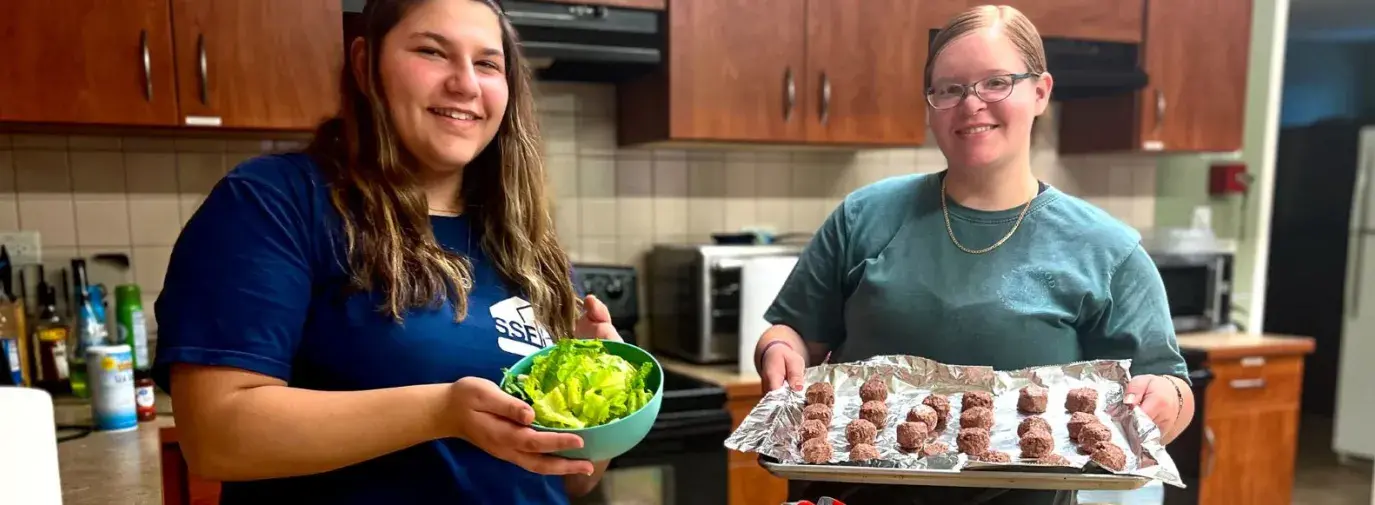
Few things bring people together like food. Steaming casseroles, warm noodles, smoked
veggies—and while we all wish we could eat great food every night, the reality is that leftovers can be monotonous, and cooking can be exhausting.
Cooking cooperatives can take the stress out of cooking several nights a week and can bring exciting flavors to the table, often for much lower prices than cooking alone. With today’s hectic schedules and evolving lifestyles, one of the many shapes and sizes of cooking co-ops may fit your unique needs.
Cooperative Cooking for Young Adults
The Southern Scholarship Foundation in Florida has been practicing cooperative living for over 60 years. A nonprofit housing community for college students made up of 26 houses across six universities, all residents are high-achieving students of underserved backgrounds. Every Monday through Thursday, two or three students will cook in bulk and the house will sit down together to have dinner.
One of the joys of cooperative cooking is the chance to try new flavors from different cultures. Julian Romero, a student at the University of Florida in Gainesville and house manager of Williams-Pilot Scholarship House, says that in a single week alone his house has eaten Korean ground beef, chicken casserole, and vegan walnut and lentil Bolognese.
Ja’Chelle Johnson, a student at Florida A&M University in Tallahassee and house manager at LaVerne Weddle Pilot Scholarship House, says that “what I like about house dinners is the sense of unity, having dinner together with other people and hearing about their days, it feels like a real family. I enjoy learning about the different cultures of people I live with.”

(Photos by the Southern Scholarship Foundation)
Cooking Co-ops for Community
Cooking cooperatives do not have to involve living together—neighbors, friends, and families can work together in unique ways to share good food without the same roof over their heads.
For example, in Birmingham, Alabama, a cooking cooperative fed three entire families for ten years— until the families’ kids were grown. Ruthann Betz-Essinger and her friends Leigh Fran and Caroline would each cook a single large meal per week to feed all three families, and package the results into thirds. One share of each big meal would stay home, with the other two portions delivered to to the other families. In other words, through the power of cooperation, each family would cook only once each week, but would receive three fully prepared dinners.
Each Sunday, the group would share the packages amongst each other. Betz-Essinger says the group would provide each other with directions on how to reheat and prepare the meals, and that her family enjoyed the variety of dinners each week’s exchange would provide.
The cooking co-op was most helpful on busy weeknights—instead of having to prepare a meal from scratch after a long day, or resort to quick take-out, Betz-Essinger would simply open her refrigerator to find a meal already assembled. After reheating, her family would enjoy a delicious, healthy, homemade dinner.
“We loved the co-op as it gave us a huge variety of food, tastes, and flavors,” says Betz-Essinger. “I loved the surprise of what was in the bag as well as trying something that I would never have made for myself.”
The cooking co-op phased out as the families began to shrink. All the children who enjoyed their families’ shared meals are now in their mid-20s, married and living in different places across the country. Ruthann, Leigh Fran, and Caroline remain friends, however, and in reflecting on her co-op experiences for this article, Ruthann says she was inspired to give a new version of a cooking co-op a try.
“I think I will call Leigh Fran and Caroline to see if we should start up the co-op again since we are all empty nesters,” says Betz-Essinger. “It would be easier this time as we would be cooking just for six!”
How To Form Your Own Cooking Co-op
The joys of community, good food, and increased quality of life is a commonality that all shapes of sizes of cooking co-ops share. Try it yourself with friends and families—you might just find it’s worth continuing for months or years to come.
- Pick people who make it very easy to get the food to them, either through a common drop-off/pick up point, or by forming a co-op with neighbors or coworkers. Set up delivery times that fit with everyone’s schedule.
- Find people whose families are similar sizes, because it makes portioning easier.
- Find people with similar food tastes and practices, or people who are open to trying new things.
- Be sensitive to different cultures, tastes, allergies, and alternative food options to make planning, cooking, and eating enjoyable and inclusive for everyone involved.
- Establish clear guidelines for what the group expects each member to make when it’s their turn. A planning calendar can help to ensure a variety of foods.
- Package foods in containers that can be both frozen, reheated, and then reused, such as Pyrex baking dishes. Secondhand and thrift stores can be an inexpensive way to acquire additional containers.
If you like to eat well, save time and money, and build community in the process, consider forming a cooking co-op.







